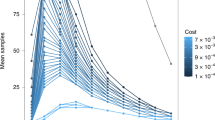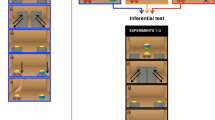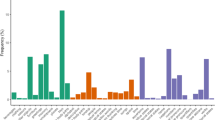Abstract
Bryant and Trabasso1 suggested that Piaget was wrong when he claimed that children below about 6 yr of age are incapable of making transitive inferences of quantity.
This is a preview of subscription content, access via your institution
Access options
Subscribe to this journal
Receive 51 print issues and online access
$199.00 per year
only $3.90 per issue
Buy this article
- Purchase on Springer Link
- Instant access to full article PDF
Prices may be subject to local taxes which are calculated during checkout
Similar content being viewed by others
References
Bryant, P. E., and Trabasso, T., Nature, 232, 456 (1971).
Piaget, J., and Inhelder, B., Le Développement des Quantités Physiques Chez l'Enfant, second ed. (Delachaux et Niestlé, Neuchatel et Paris, 1962).
Piaget, J., and Szeminska, A., La Genèse du Nombre Chez l'Enfant, third ed. (Delachaux et Niestlé, Neuchatel et Paris, 1964).
Piaget, J., and Inhelder, B., La Représentation de l'Espace Chez l'Enfant (P.U.F., Paris, 1948).
Piaget, J., and Inhelder, B., Genèse des Structures Logiques Elémentaires, second ed. (Delachaux et Niestlé, Neuchatel et Paris, 1967).
Author information
Authors and Affiliations
Rights and permissions
About this article
Cite this article
DE BOYSSON-BARDIES, B., O'REGAN, K. What Children Do in Spite of Adults' Hypotheses. Nature 246, 531–534 (1973). https://doi.org/10.1038/246531b0
Received:
Revised:
Issue Date:
DOI: https://doi.org/10.1038/246531b0
This article is cited by
-
Primate errors in transitive ‘inference’: a two-tier learning model
Animal Cognition (2006)
-
Fuzzy processing in transitivity development
Annals of Operations Research (1990)
-
Are monkeys logical?
Nature (1977)
-
Spontaneous measurement by young children
Nature (1976)
Comments
By submitting a comment you agree to abide by our Terms and Community Guidelines. If you find something abusive or that does not comply with our terms or guidelines please flag it as inappropriate.



